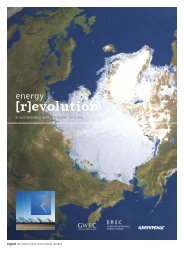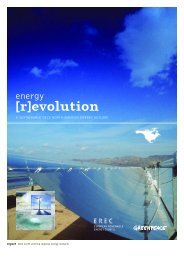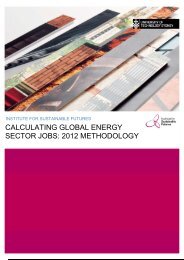download the mexico energy revolution scenario
download the mexico energy revolution scenario
download the mexico energy revolution scenario
Create successful ePaper yourself
Turn your PDF publications into a flip-book with our unique Google optimized e-Paper software.
image NORTH HOYLE WIND FARM,<br />
UK’S FIRST WIND FARM IN THE IRISH<br />
SEA WHICH WILL SUPPLY 50,000 HOMES<br />
WITH POWER.<br />
© ANTHONY UPTON 2003<br />
alone, <strong>the</strong> wind industry grew by nearly 40%. The renewable <strong>energy</strong><br />
industry now employs around two million people worldwide and has<br />
become a major feature of national industrial development plans.<br />
In <strong>the</strong> US, wind already employs more people than coal.<br />
Meanwhile, <strong>the</strong> economics of renewables are expected to fur<strong>the</strong>r<br />
improve as <strong>the</strong>y develop technically, and as <strong>the</strong> price of fossil fuels<br />
continues to rise and as <strong>the</strong>ir saving of carbon dioxide emissions is<br />
given a monetary value. These cost comparisons, already favorable<br />
to renewables, don’t even account for <strong>the</strong> massive externalized costs<br />
of fossil fuels such as <strong>the</strong> oil spill in <strong>the</strong> Gulf of Mexico.<br />
Despite <strong>the</strong> small drop in fossil fuel emissions in <strong>the</strong> industrialized<br />
world as a result of <strong>the</strong> economic crisis, globally <strong>the</strong> level of <strong>energy</strong><br />
related carbon dioxide continues to grow. This means that a<br />
recovered economy will result in increasing CO2 emissions once<br />
again, fur<strong>the</strong>r contributing to <strong>the</strong> greenhouse gases which threaten<br />
our planet. A shift in <strong>energy</strong> policy is needed so that a growing<br />
economy and reduced CO2 emissions can go hand in hand. The<br />
Energy [R]evolution analysis shows how this is possible.<br />
Although <strong>the</strong> Copenhagen climate change conference at <strong>the</strong> end of<br />
2009 was a huge disappointment, it should not lead to a feeling<br />
that nothing can happen. A change in <strong>energy</strong> policy has to be<br />
connected to a change of climate policy. The United Nations<br />
(UNFCCC) climate talks <strong>the</strong>refore still remain central to <strong>the</strong><br />
survival of our planet and a global regime for CO2 reduction.<br />
Placing a price on carbon, as well as a long term agreement on CO2<br />
reduction, are both of vital importance for <strong>the</strong> uptake of renewables<br />
and <strong>energy</strong> efficiency. The achievement of a new ‘fair, ambitious and<br />
legally binding’ (FAB) deal relies fundamentally on legally binding<br />
emissions reduction obligations, on common guidelines for<br />
accounting rules, on a compliance regime and on agreed carbon<br />
trading mechanisms.<br />
The advanced Energy [R]evolution <strong>scenario</strong> has changed five<br />
parameters compared to <strong>the</strong> basic version. These mean that <strong>the</strong><br />
economic lifetime of coal power stations has been reduced from 40<br />
to 20 years, <strong>the</strong> growth rate of renewables has taken <strong>the</strong> advanced<br />
projections of <strong>the</strong> renewable industry into account, <strong>the</strong> use of<br />
electric drives in <strong>the</strong> transport sector will take off ten years earlier,<br />
<strong>the</strong> expansion of smart grids will happen quicker, and last but not<br />
least, <strong>the</strong> expansion of fossil fuel based <strong>energy</strong> will stop after 2015.<br />
A drastic reduction in CO2 levels and a share of over 80%<br />
renewables in <strong>the</strong> world <strong>energy</strong> supply are both possible goals by<br />
2050. Of course this will be a technical challenge, but <strong>the</strong> main<br />
obstacle is political. We need to kick start <strong>the</strong> Energy [R]evolution<br />
with long lasting reliable policy decisions within <strong>the</strong> next few years. It<br />
took more than a decade to make politicians aware of <strong>the</strong> climate<br />
crisis; we do not have ano<strong>the</strong>r decade to agree on <strong>the</strong> changes needed<br />
in <strong>the</strong> <strong>energy</strong> sector. Greenpeace and <strong>the</strong> renewables industry present<br />
<strong>the</strong> Energy [R]evolution <strong>scenario</strong> as a practical but ambitious<br />
blueprint. For <strong>the</strong> sake of a sound environment, political stability and<br />
thriving economies, now is <strong>the</strong> time to commit to a truly secure and<br />
sustainable <strong>energy</strong> future – a future built on <strong>energy</strong> efficiency and<br />
renewable <strong>energy</strong>, economic development and <strong>the</strong> creation of millions<br />
of new jobs for <strong>the</strong> next generation.<br />
Christine Lins<br />
SECRETARY GENERAL<br />
EUROPEAN RENEWABLE<br />
ENERGY COUNCIL (EREC)<br />
SEPTEMBER 2010<br />
Sven Teske<br />
CLIMATE & ENERGY UNIT<br />
GREENPEACE INTERNATIONAL<br />
<strong>energy</strong> [r]evolution 2010<br />
This is <strong>the</strong> third edition of <strong>the</strong> global Energy [R]evolution <strong>scenario</strong><br />
since <strong>the</strong> first one was published in January 2007, each analysis<br />
deeper than <strong>the</strong> last. In <strong>the</strong> second edition we introduced specific<br />
research for <strong>the</strong> transport sector and an investigation of <strong>the</strong><br />
pathway to future investment in renewable energies. Since <strong>the</strong>n we<br />
have published country-specific <strong>scenario</strong>s for over 30 countries and<br />
regions, added a study of <strong>the</strong> employment implications of <strong>the</strong><br />
<strong>scenario</strong>s and a detailed examination of how <strong>the</strong> grid network needs<br />
to be improved and adapted.<br />
Gustavo Ampugnani<br />
CLIMATE CAMPAIGN<br />
GREENPEACE MEXICO<br />
This new edition has broken fresh ground again. The 2010 Energy<br />
[R]evolution not only includes <strong>the</strong> financial analysis and<br />
employment calculations in parallel with <strong>the</strong> basic projections, we<br />
have also added a second, more ambitious Energy [R]evolution<br />
<strong>scenario</strong>. This was considered vital because rapid improvements in<br />
climate science made it clear during 2009 that a global 50%<br />
reduction in <strong>energy</strong> related CO2 emissions by 2050 might not be<br />
enough to keep <strong>the</strong> global mean temperature rise below +2°C. An<br />
even greater reduction may be needed if runaway climate change is<br />
to be avoided.<br />
7



![Energy [R]evolution - European Commission](https://img.yumpu.com/49109324/1/184x260/energy-revolution-european-commission.jpg?quality=85)


![5905 gp [eu rev]csfr4.qxd - Energy [R]evolution](https://img.yumpu.com/42305023/1/184x260/5905-gp-eu-revcsfr4qxd-energy-revolution.jpg?quality=85)


![5905 gp [eu rev]csfr4.qxd - Energy [R]evolution](https://img.yumpu.com/28729264/1/184x260/5905-gp-eu-revcsfr4qxd-energy-revolution.jpg?quality=85)